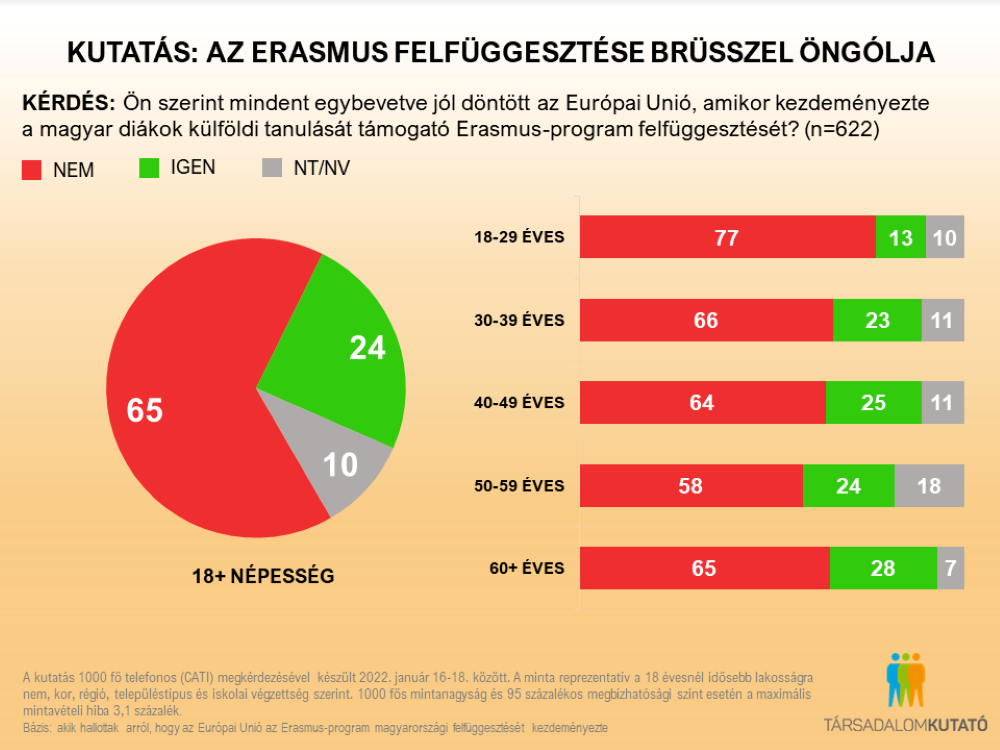Young people were the most outraged by the European Union when it proposed the suspension of the Erasmus program in Hungary, according to the Social Researcher's survey last week.
The decision-makers in Brussels presumably wanted to put pressure on the Hungarian government, but in fact they whipped up resentment against the European Union. At least that's what the numbers show.
Two-thirds (65%) of those informed about the initiative, including more than three-quarters (77%) of the 18-29-year-old age group, condemn the suspension of the program supporting the study of Hungarian students at EU universities.
The suspension of the Erasmus program in Hungary exploded like a bombshell two weeks ago, so it is not surprising that the majority of all groups in Hungarian society claimed during last week's survey that they had learned about the pressure exerted by Brussels.
When asked if they had heard that "the European Union initiated the suspension of the Erasmus program in Hungary", 62 percent of the respondents answered yes, i.e. almost every second out of three respondents.
The high news value of the initiative is also reflected in the fact that many people were able to form an opinion on the case. When asked whether "all things considered" the European Union made the right decision when it "initiated the suspension of the Erasmus program supporting Hungarian students studying abroad", 62 percent of all respondents, and 65 percent of those who knew the news, answered no.
This means that with the prospect of suspending the Erasmus program in Hungary
the Commission provoked the resentment of nearly five million Hungarians.
All of this is emphatically supported by the fact that, especially among young adults (between the ages of 18 and 29), the potential beneficiaries of the Erasmus program, there is a high level of rejection of pressure from Brussels.
Among young people, those who heard about the suspension essentially disapproved of it by four out of five (77 percent).

Source: Social researcher
The Social Researcher prepared the "Hungarian Youth 2020" research. The data from this show that about 100,000 of the then 15-29-year-olds (eight percent of the entire youth sample) planned to study abroad. The possible suspension of the Erasmus program would therefore complicate the study plans of up to a hundred thousand young people.
The decision-makers in Brussels presumably wanted to put pressure on the Hungarian government with their initiative, but in fact they whipped up antipathy towards the European Union. According to the Eurobarometer survey funded by the European Union, 69 percent of Hungarians between the ages of 15 and 24 (56 percent of the total population) "trust the European Union." While Hungarians, and especially young Hungarians, are generally more pro-EU, on this issue, the majority of young people in particular are critical of the EU. All of this could hardly have been the intention of the Brussels decision.
It is also interesting that the political polarization characteristic of Hungarian society prevails only moderately in this matter. It is less surprising that 76 percent of those satisfied with the Hungarian government condemn the EU decision to suspend the Erasmus program (4 no). However, it is worth noting that those dissatisfied with the Hungarian government are divided: 42 percent of them condemn the Brussels decision, 38 percent do not. Therefore, there is no group in Hungarian society that is on the side of Brussels in the Erasmus matter.
Featured image: Getty Images












